All night last night the fire across the river continued to burn and the smoke roll across the moon-lighted sky. It made quite a picture, one of silver and black to which the explosions that came at irregular intervals brought angry flashes of orange and red.
Today, the open city of Manila, but two days old, unexpectedly came of age. Suddenly it felt very old.
There were no military forces, either defensive or offensive, inside the city and its suburbs. There were no anti-aircraft guns in or near Manila. We had been quite thorough about being an open city.
Just below the Jones Bridge over the Pasig were docked four interisland vessels. Across the river and closer to its mouth were several others. Their owners had been ordered to move the ships out into the bay at least a week ago, but the ships remained where they were. Moving the ships meant trouble and expense. These were bad times. We must retrench, gentlemen.
Shortly before noon, for three whole hours, Japanese bombers tried to get those ships. Their aim was truly execrable, not one of the ships was hit, but before they went away, they killed 43 people, wounded at least 150 and destroyed 5,000,000 pesos worth of public and private buildings.
The open city of Manila had failed to take into account one thing. There was one factor it had overlooked. It had not considered the enemy’s bad aim.
Now that the bad business of declaring Manila open had been found bankrupt, now that we were in the war again, now that we had been relieved of our secret shame, the city took heart once more and strangers in the streets looked into each other’s eyes and gave each other a small significant smile. The city had recovered its honor and need not fear to face the soldiers when they come back.
And in spite of the death and the damage done, because they were done by the enemy’s bad aim, the city felt it was scored a victory.
I was on Escolta when the bombers came. When the bombs came –sounding so near– some of the people in the store I was caught in by the raid fell on their faces as they had read in the papers they should do in such emergencies. But the others, while the bombs came “thud-thud-thud”, made no movement but stood where they were. The salesgirls grew pale but kept their places behind the glass counters. After the explosions, those who had flung themselves on the floor got up and grinned sheepishly. Then the bombs thudded again and they resumed their former position. Somebody said something and swift laughter went though the store like a point of light in a blackout.
Someday, someone will write in detail about the men and women of Manila, how they conducted themselves, under bombardment. Meanwhile, these men and women, who used to look up and down the street so carefully before crossing, now go downtown and face the possibility of death without thinking too much about it.
“It is remarkable,” observed a woman I knew, “how the human being can take, how the human frame can adjust itself to all sorts of conditions.”
She herself is going to have a baby.
The enemy continued to advance slowly in the north and in the south and land reinforcements. In the north the battle-line followed the Agno River, in the south the fighting was clustered in the Atimonan area.
In Washington, the British Prime Minister, Winston Churchill, declared that the democracies would take the initiative in 1943.
“The United States and Britain will give Japan a lesson the Japanese and the world will never forget.”
